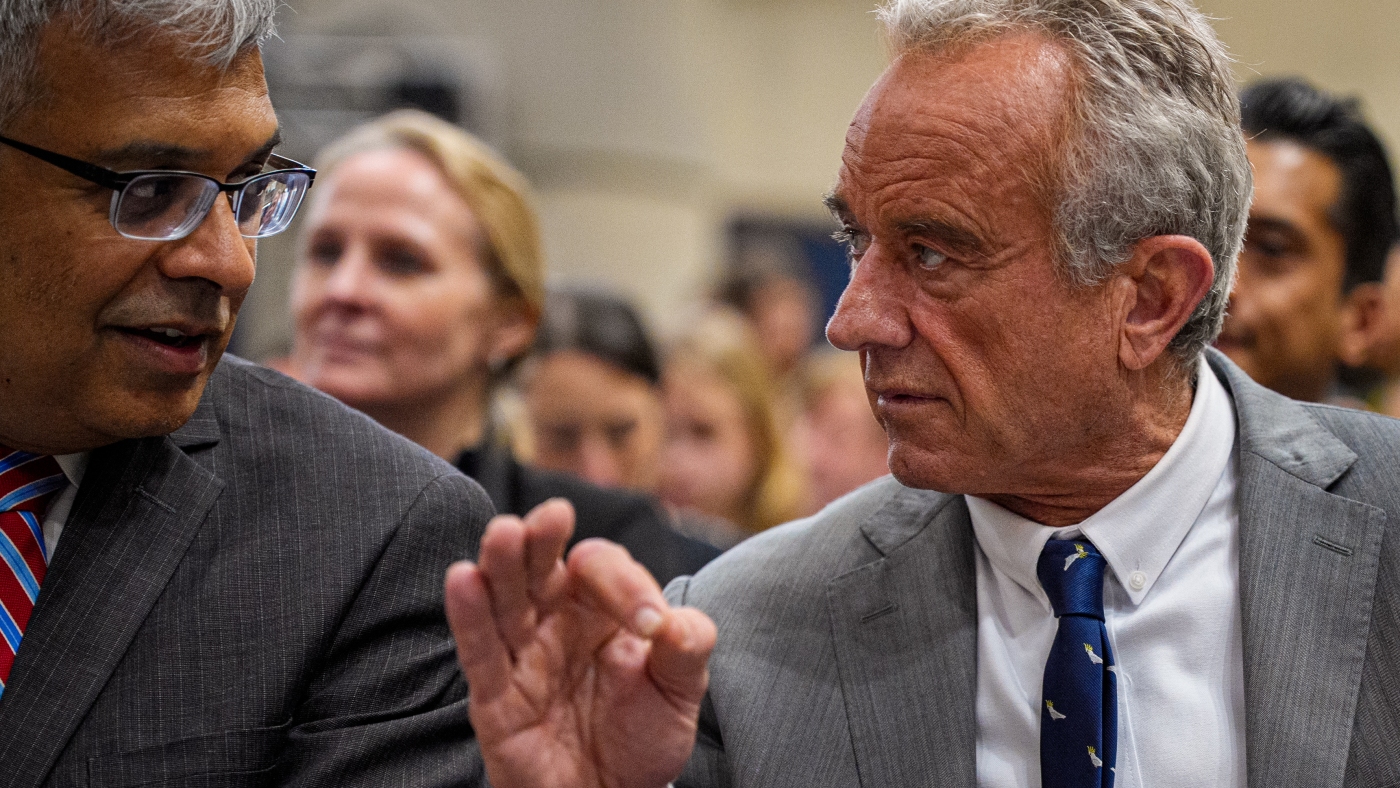
NIH Director Jayanta Bhattacharya, left, and Well being and Human Providers Secretary Robert F. Kennedy Jr. communicate earlier than a information convention on the Well being and Human Providers Division on April 22.
Andrew Harnik/Getty Pictures
conceal caption
toggle caption
Andrew Harnik/Getty Pictures
The Nationwide Institutes of Well being will use info from federal medical health insurance applications Medicare and Medicaid to create a “real-world knowledge platform” to find out the reason for autism, the company introduced this week.
The Division of Well being and Human Providers mentioned in a press release on Wednesday that the NIH would crew up with the Facilities for Medicare & Medicaid Providers (CMS) to create the database using insurance coverage claims, digital medical data and knowledge from wearable gadgets with well being sensors, like smartwatches.
“We’re utilizing this partnership to uncover the foundation causes of autism and different persistent illnesses,” HHS Secretary Robert F. Kennedy Jr. mentioned in a press release.
HHS mentioned that CMS and NIH would set up a knowledge use settlement targeted on Medicare and Medicaid enrollees — about 36% of People — and comply with autism diagnoses earlier than increasing their analysis into further persistent well being situations.
“Utilizing ASD [Autistic Spectrum Disorders] because the pilot analysis program, groups at CMS and NIH will set up a safe tech-enabled mechanism to reinforce this knowledge sharing with well timed, privateness and safety compliant knowledge alternate,” the assertion learn.
There was outrage final month after NIH Director Jay Bhattacharya informed his employees of plans to compile a database of People with autism utilizing personal knowledge that might be used to create a nationwide autism registry
Unnamed HHS sources informed a number of information shops that the companies are usually not creating an autism registry and described the trouble as an alternative as a real-world knowledge platform linking present datasets. NPR has not independently confirmed the reporting.
In Wednesday’s assertion, NIH’s Bhattacharya mentioned that the partnership with CMS was “an essential step in our dedication to unlocking the facility of real-world knowledge to tell public well being selections and enhance lives.”
“Linking CMS claims knowledge with a safe real-world NIH knowledge platform, totally compliant with privateness and safety legal guidelines, will unlock landmark analysis into the complicated elements that drive autism and persistent illness — finally delivering superior well being outcomes to the People we serve,” he mentioned.
NPR has reached out to HHS, NIH and CMS, however none responded to requests for remark earlier than publication of this story.
The most recent particulars instantly raised extra alarm bells for the autistic neighborhood and privateness consultants, who questioned how this knowledge could be used and the way sufferers’ delicate knowledge could be protected.
Helen Tager-Flusberg is the director of the Heart for Autism Analysis at Boston College and chief of the Coalition of Autism Scientists, a corporation shaped in response to Kennedy’s broadly debunked views on autism.
She warned of the potential for info collected on this database to be abused.
“CMS knowledge contains sure details about people — age/date of delivery, intercourse, the place they reside. It’s attainable to establish an individual primarily based on data about these traits,” Tager-Flusberg mentioned in an electronic mail to NPR.
“Whereas the NIH Director supplies assurances that privateness protections shall be put in place, we’ve seen different examples of how this administration has given permission to establish folks to sure folks working for the federal authorities. How will this registry be protected?” she requested.
The heightened public deal with autism comes as Kennedy has repeatedly vowed to establish the reason for the dysfunction and finally eradicate it.
To that finish, Kennedy, a former environmental lawyer, has made a lot of baseless, conspiratorial claims about autism, together with that it may be traced again to childhood vaccinations and that an “environmental toxin” is responsible for the uptick in autism diagnoses over time.
He described autism as “a preventable illness” and mentioned his company would discover the foundation reason behind the dysfunction by September.
The notion that vaccines trigger autism has been completely debunked in medical science, and consultants say there’s possible no single trigger for autism. Bhattacharya, the NIH director, pushed again on the September deadline to discover a trigger and mentioned {that a} 12 months timeline was extra life like.
And whereas a Facilities for Illness Management and Prevention report did discover that autism prevalence in the USA had elevated from 1 in 36 kids 5 years in the past, to 1 in 31 kids in 2022, it’s extra possible that that is due largely to extra complete screening throughout a broader inhabitants.




